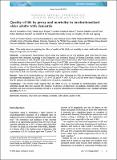Por favor, use este identificador para citar o enlazar a este item:
http://hdl.handle.net/10261/109741COMPARTIR / EXPORTAR:
 SHARE SHARE
 CORE
BASE CORE
BASE
|
|
| Visualizar otros formatos: MARC | Dublin Core | RDF | ORE | MODS | METS | DIDL | DATACITE | |

| Título: | Quality of life by proxy and mortality in institutionalized older adults with dementia |
Autor: | González Vélez, Abel E.; Forjaz, María João; Giráldez-García, Carolina; Martín-García, Salomé; Martínez-Martín, Pablo | Palabras clave: | Dementia Long-term care settings Mortality Older adults Quality of life |
Fecha de publicación: | 23-ene-2015 | Editor: | John Wiley & Sons | Citación: | Geriatrics & Gerontology International 15(1): 33-44 (2015) | Resumen: | Aim: This study aimed at analyzing the effect of quality of life (QoL) on mortality in older adults with dementia living in long-term care facilities. Methods: A prospective observational cohort study was carried out on 412 residents aged older than 60 years, diagnosed with dementia according to the Diagnostic and Statistical Manual of Mental Disorders, fourth edition. Besides assessment of QoL (EQ-5D index by proxy) and perceived health status (EQ-VAS), baseline measurements included severity of dementia (Clinical Dementia Rating Scale [CDR]), comorbidity (number of self-reported chronic conditions), disability evaluation (Barthel Index), cognitive state (Mini Examen Cognoscitivo, a validated and modified Spanish version of the Mini-Mental State Examination) and depression (Cornell Depression Scale for Dementia). Sociodemographic and clinical variables were analyzed as potential effect modifiers and confounders in the relationship between QoL and mortality using a multivariate logistic regression analysis. Results: After an 18-month follow up, 138 residents had died. Adjusting for CDR and Barthel Index, the odds of mortality were multiplied by 0.25 (95% CI 0.09–0.70) and 0.79 (95% CI 0.26–2.42) for every unit of change in the EQ-5D index in the residents with Cornell score <6 and ≥6, respectively. Conclusion: The present study suggests that the effect of QoL on mortality in institutionalized adults with dementia should take into account the presence or absence of depression. In addition, residents with a greater disability and more advanced dementia should be a target for interventions in rehabilitation care. | Versión del editor: | https://onlinelibrary.wiley.com/doi/abs/10.1111/ggi.12225 | URI: | http://hdl.handle.net/10261/109741 | DOI: | 10.1111/ggi.12225 | ISSN: | 1447-0594 |
| Aparece en las colecciones: | (CCHS-IEGD) Artículos |
Ficheros en este ítem:
| Fichero | Descripción | Tamaño | Formato | |
|---|---|---|---|---|
| Gonzalez_Velez_et_al_Geriatrics_Gerontology_International_2014_first online_1_7_10 1111 ggi 12225.pdf | 166,33 kB | Adobe PDF |  Visualizar/Abrir |
CORE Recommender
SCOPUSTM
Citations
15
checked on 18-abr-2024
WEB OF SCIENCETM
Citations
12
checked on 26-feb-2024
Page view(s)
349
checked on 23-abr-2024
Download(s)
427
checked on 23-abr-2024
Google ScholarTM
Check
Altmetric
Altmetric
NOTA: Los ítems de Digital.CSIC están protegidos por copyright, con todos los derechos reservados, a menos que se indique lo contrario.
